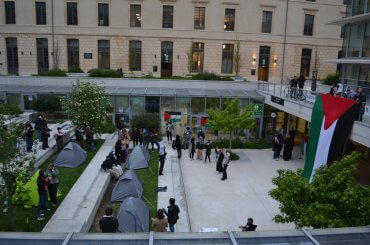Students at Butler University are demanding to know why an event featuring Angela Davis was abruptly canceled by the school.
The activist and author was scheduled to speak at an event called “Joint Struggle and Collective Liberation” on April 1st. On March 29, the school canceled the event without notifying the organizers of the event.
The school is blaming the cancellation on procedural errors, but a group of campus and community organizations put out a statement saying Davis was targeted over her BDS support. “Days before Butler University’s shameless censorship of Dr. Angela Davis, the Student Government Association was bombarded by pressure from Zionist students who claimed to oppose Davis’ event because of her support for Boycott, Divestment, and Sanctions (BDS) movement — a grassroots demand for nonviolent economic pressure against Israel’s illegal military occupation of Palestine,” the statement reads.
An Op-Ed in The Butler Collegian by Roua Daas, who serves as the Director of Diversity, Equity, and Inclusion for the Student Government Association at Butler University, adds, “Simply put, Butler administrators are trying to silence marginalized voices in order to maintain systems of power and privilege.”
This isn’t the first time Davis has been attacked by pro-Israel groups and students. Just last month, a talk she gave for Northeastern University was condemned by Northeastern Hillel, a pro-Israel campus group. The group claimed that BDS was an “anti-semitic movement that seeks to discriminate against Israel and Jews.”
In 2019, the Birmingham Civil Rights Institute rescinded a human rights award that it planned to give Davis. In a statement, she said that the award had been revoked over her longtime support for Palestine. Birmingham Mayor Randall Woodfin said the decision had been made after “protests from our local Jewish community and some of its allies.”
“Through my experiences at Elizabeth Irwin High School in New York City and at Brandeis University in the late fifties and early sixties, and my subsequent time in graduate school in Frankfurt, Germany, I learned to be as passionate about opposition to antisemitism as to racism,” read Davis’s statement at the time. “It was during this period that I was also introduced to the Palestinian cause. I am proud to have worked closely with Jewish organizations and individuals on issues of concern to all of our communities throughout my life. In many ways, this work has been integral to my growing consciousness regarding the importance of protesting the Israeli occupation of Palestine.”



2 of 2
“Within Israel itself, the free speech rights of Palestinians are brutally suppressed, & even Jews supportive of Palestinian rights are regularly harassed by the state. Abeer Alnajjar of Open Democracy wrote last year about how ‘major, mainstream news media outlets are sensitized against any reference to Palestinian rights or international law, and any criticism of Israel or its policies.’”
1 of 2
How the Media Cracks Down on Critics of Israel ❧ Current Affairs
The Guardian, “How the Media Cracks down on critics of Israel” By Nathan J. Robinson, Feb. 10/21
EXCERPT:
“It is widely recognized that critics of Israel, no matter how well-founded the criticism, are routinely punished by both public & private institutions for their speech. The American Civil Liberties Union (ACLU) has documented a pattern by which ‘those who seek to protest, boycott, or otherwise criticize the Israeli government are being silenced,’ a trend that ‘manifests on college campuses, in state contracts, & even in bills to change federal criminal law’ & ‘suppress[es] the speech of people on only one side of the Israel-Palestine debate.’ The Center for Constitutional Rights has shown that ‘Israel advocacy organizations, universities, government actors, & other institutions’ have targeted pro-Palestinian activists with a number of tactics ‘including event cancellations, baseless legal complaints, administrative disciplinary actions, firings, & false & inflammatory accusations of terrorism & antisemitism’ & concludes that there is a ‘Palestine exception to free speech.’
“The effort to keep critics of Israel quiet sometimes takes the form of explicit government action—there is an open campaign to criminalize speech critical of Israel & some states even require oaths from government employees promising not to boycott Israel. But as Israeli journalist Gideon Levy notes in the Middle East Eye, it often comes in the form of baseless (& offensive) accusations that criticisms of Israel are definitionally anti-Semitic. In the United States, academic critics of Israel have had job offers rescinded or been otherwise kept from teaching, & CNN fired academic Marc Lamont Hill over his call for a free Palestine. In Britain, there has been a years-long absurd campaign to tar former Labour leader (& critic of Israeli government policy) Jeremy Corbyn as an anti-Semite. Human Rights Watch notes that the United States government has wielded unfounded accusations of anti-Semitism against it & against other human rights groups like Amnesty and Oxfam that have exposed Israel’s shoddy human rights record. (cont’d)
The group claimed that BDS was an “anti-semitic movement that seeks to discriminate against Israel and Jews.”
They claim correctly!